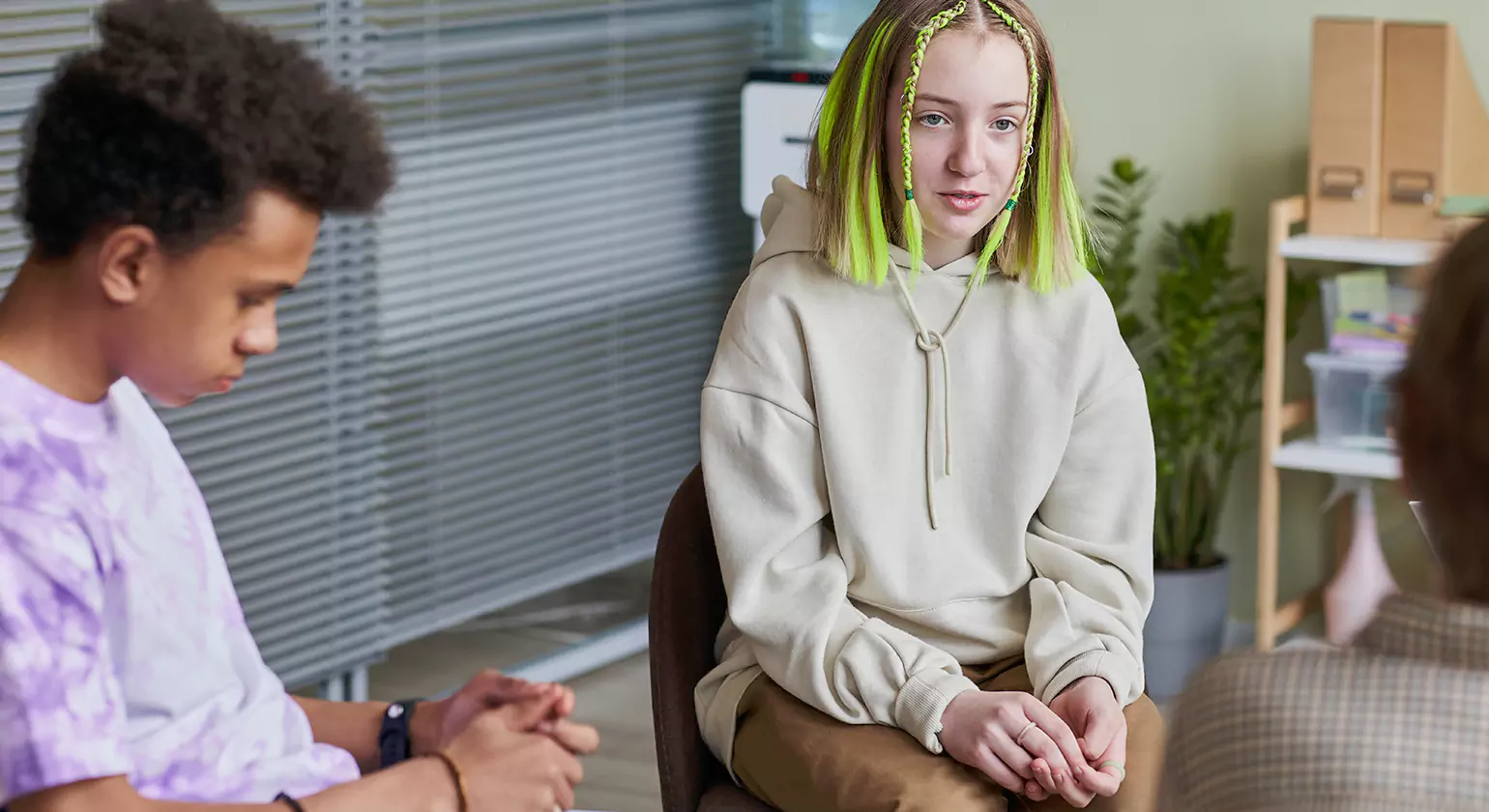Table of Contents
Introduction
Teenagers face unique challenges that can sometimes feel overwhelming. From navigating school pressures and social dynamics to coping with mental health struggles like anxiety, depression, or self-esteem issues, it’s a critical time for emotional development. Group therapy can offer an ideal space for teens to connect, share experiences, and learn healthier coping mechanisms in a supportive environment.
If you’re searching for group therapy ideas for teens, you are likely looking for activities and approaches that foster communication, trust, and emotional growth. Whether you’re a therapist, counselor, or concerned parent, this guide will help you explore some of the best strategies for facilitating effective and engaging group therapy sessions for teenagers.
In this post, we will discuss the benefits of group therapy for teens, provide a variety of group therapy ideas, and explore how each activity can aid in emotional development, self-awareness, and interpersonal skills.
Why Group Therapy for Teens?

Before we delve into specific group therapy ideas, it’s important to understand why group therapy is such an effective tool for teenagers.
1. Building Connections
Teens are often dealing with feelings of isolation, especially when facing mental health challenges. Group therapy allows them to connect with others who are going through similar struggles, helping reduce feelings of loneliness.
2. Developing Social Skills
Group therapy provides a safe environment for teens to practice social skills, such as communication, empathy, and conflict resolution. These are invaluable skills that can help them navigate relationships both in and outside of therapy.
3. Learning Coping Strategies
By participating in group therapy, teens can learn healthy ways to cope with stress, anxiety, and emotional regulation. They can benefit from the shared experiences of others, gaining new perspectives on how to manage challenges.
4. Building Confidence
Talking openly in front of others helps teens develop self-confidence. As they share their experiences and listen to others, they often find validation and reassurance that they’re not alone in their struggles.
Now that we understand the benefits, let’s look at some effective group therapy ideas for teens.
Icebreaker Activities

Starting a group therapy session with an icebreaker can set the tone for open communication and trust. These activities help teens get to know each other and feel more comfortable in a group setting.
"Two Truths and a Lie"
This classic game involves each participant saying three statements about themselves—two of which are true and one is false. The group then guesses which statement is the lie. This activity encourages teens to share personal information and engage in light-hearted conversation, which helps ease any initial tension.
"Name and One Word"
Have each teen introduce themselves by stating their name and one word that describes how they’re feeling that day. This simple activity helps teens express their emotions in a non-threatening way, and it can serve as a good segue into deeper conversations about emotions.
Creative Expression Exercises

Creative expression activities are a fantastic way to engage teens and help them explore their emotions without having to articulate everything directly. Art and creativity often help individuals open up and connect with their feelings.
"Feelings Collage"
Provide magazines, scissors, glue, and large sheets of paper, and ask each teen to create a collage that represents their current emotional state. Afterward, allow them to share their collages with the group, discussing the images, colors, and words they chose. This activity fosters self-awareness and opens the door to conversations about emotional expression.
"Creative Writing"
Ask each teen to write a short poem or story based on a given prompt, such as “What does your perfect day look like?” or “Describe your emotions using colors.” Writing allows teens to explore their feelings in a creative and personal way, and sharing their work can help them feel heard and understood.
Group Discussions and Reflection

Group discussions can be one of the most powerful aspects of therapy. By discussing specific topics related to their struggles, teens can gain insight into their thoughts, feelings, and behaviors.
"Coping Strategies Sharing"
Each teen can share their coping mechanisms for managing stress, anxiety, or negative emotions. As they listen to others, they might discover new strategies that work for them. This exercise also allows teens to feel supported by others who are experiencing similar emotions.
"Mindfulness Practice and Discussion"
Start by guiding the group through a short mindfulness or meditation session. Afterward, lead a discussion on how the exercise made them feel, what challenges they encountered, and how mindfulness can help in everyday situations. This encourages mindfulness as a valuable tool for managing emotional responses.
Role-Playing Exercises

Role-playing can be incredibly helpful for teens to practice communication skills, empathy, and perspective-taking. It can also help them work through challenging social situations they might face.
"Conflict Resolution Role Play"
Have the teens role-play a situation where they need to resolve a conflict with a friend, teacher, or family member. One teen could play the role of the person they are having conflict with, while the others observe and offer constructive feedback. Role-playing helps teens practice calm and constructive communication in difficult scenarios.
"Empathy Role Play"
Ask the teens to imagine a difficult situation, such as a friend going through a tough time. Each teen will take turns responding as if they were the person experiencing the issue, and the others will practice expressing empathy. This helps build emotional intelligence and social awareness.
Gratitude and Positivity Exercises

Teens often focus on the negative aspects of their lives, especially when dealing with mental health challenges. Gratitude and positivity exercises can shift their mindset and help them recognize the good in their lives.
"Gratitude Circle"
At the beginning or end of each session, ask each teen to share something they’re grateful for. This could be anything from a supportive friend to a favorite hobby. The act of sharing gratitude fosters a sense of positivity and connection within the group.
"Positive Affirmations"
Encourage teens to write positive affirmations on small pieces of paper. These could be affirmations about their worth, talents, or things they like about themselves. Have each teen share their affirmation with the group, which can help boost self-esteem and promote self-acceptance.
Social Skill Building Activities

Teens benefit from developing strong social skills, especially when it comes to making friends, resolving conflicts, and communicating effectively. Group therapy can provide a safe space for practicing these skills.
"Compliment Circle"
Have the teens sit in a circle and take turns giving genuine compliments to the person sitting next to them. This helps teens practice both giving and receiving compliments, which can improve self-esteem and foster positive social interactions.
"Active Listening Exercise"
In this activity, one teen speaks for two minutes about a topic of their choice, while the others practice active listening. After the speaker is done, each listener summarizes what they heard and offers feedback. This helps teens build listening skills and encourages them to be present in conversations.
Team Building and Collaboration Activities

Working together as a team can help teens develop trust, cooperation, and problem-solving skills.
"Group Problem-Solving Challenges"
Present the group with a problem or challenge, such as building a structure from limited materials (e.g., straws, rubber bands, and paper clips). The group must collaborate to find a solution. This encourages teamwork, communication, and creativity, and reinforces the idea that they can achieve more together than individually.
"Trust Falls"
A classic team-building exercise, the trust fall involves one teen standing with their back to the group and falling backward, trusting that the others will catch them. This physical activity helps build trust and reinforces the idea that the group is a safe, supportive environment.
Emotional Check-Ins

Regular emotional check-ins are crucial to understanding the individual needs of each teen in the group. These brief but powerful sessions allow participants to express how they’re feeling and gauge their emotional state throughout the process.
"Mood Meter"
Each teen indicates their current emotional state using a visual tool like a mood meter, which can range from happy and excited to anxious or sad. After the check-in, facilitate a brief discussion about why they chose their current mood and how they can shift negative emotions into more positive ones. This helps promote emotional awareness and regulation.
"Feelings Wheel"
The Feelings Wheel is a great tool for helping teens articulate their emotions. It consists of a wheel with various feelings and emotions listed in different segments, ranging from basic feelings like “happy” or “sad” to more nuanced emotions such as “guilty,” “nervous,” or “hopeful.”
During the emotional check-in, ask each teen to select a feeling from the wheel that best represents their current emotional state. They can then share with the group why they chose that emotion, providing insight into their experiences and thoughts.
Self-Care and Wellness Activities

Self-care is essential for maintaining mental health, and group therapy provides an excellent opportunity to explore different self-care strategies.
"Self-Care Plans"
Encourage each teen to create a personalized self-care plan, outlining activities they enjoy or find soothing, such as reading, exercising, or spending time with friends. Sharing these plans with the group allows others to learn new ways of caring for themselves and reinforces the importance of self-compassion.
"Body Scan Relaxation"
Guide the group through a body scan relaxation technique, where teens focus on relaxing each part of their body, starting from their toes and moving upward. This activity helps teens become aware of physical tension and learn relaxation techniques that can reduce anxiety.
Conclusion
Group therapy can be an incredibly powerful tool for helping teens navigate the complexities of adolescence and mental health challenges. The activities mentioned in this guide—ranging from creative expression to team-building exercises—provide opportunities for teens to connect, share, and grow in a supportive and safe environment. By engaging in these group therapy ideas for teens, you can encourage communication, emotional growth, and healthy coping strategies.
If you’re a parent seeking to support your teen, explore professional group therapy options to help them manage their emotions and challenges. Together, we can positively impact the mental health and well-being of our teens.
Read more –
The Social Dilemma – Social Media and Your Mental Health
Top Questions to Ask Teens for Building Emotional Intelligence



